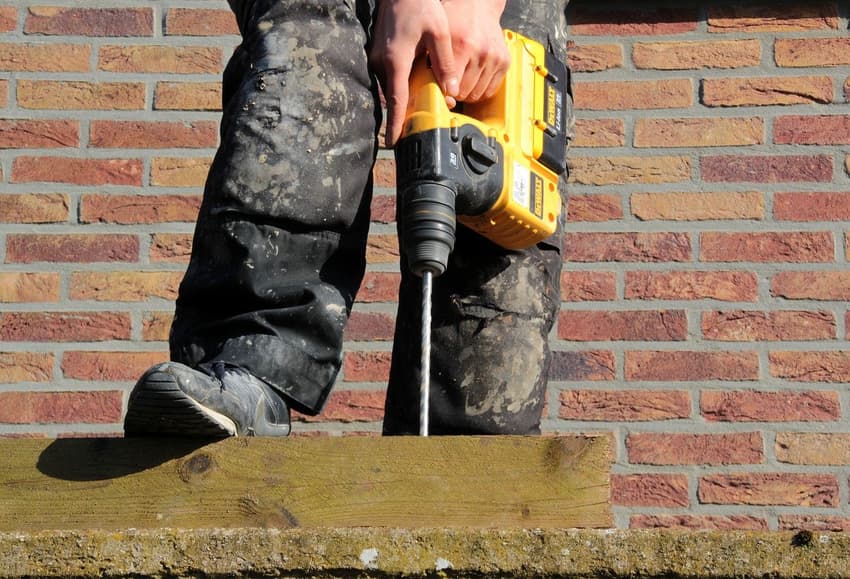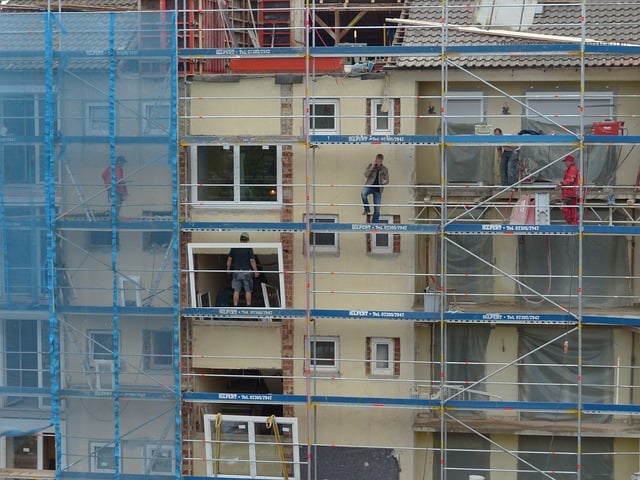Noisy construction work in Spain: What are my rights?

Sometimes living in Spain can seem like you’re trapped in a perpetual building site. But if noise levels get too much, what are your rights as a tenant or owner and what you can do about it?
Wherever you are in Spain, from Barcelona to the Canary Islands, there always seems to be some type of building or renovation work going on.
Whether your neighbour is doing a simple kitchen revamp lasting a few weeks or you have to deal with the complete construction of a whole apartment block opposite your building, taking several years, construction noise is a common issue in Spain.
Noise levels, disturbance and dust can be a major problem when works are being carried out, especially since many people are still working from home during the pandemic and are not in sound-proofed offices.
The constant noise of tile cutters, electric saws and hammering can be enough to drive anyone insane, let alone when you’re trying to conduct online meetings at home or concentrate on writing your latest report.
What are my rights?
Exceeding legal noise levels and disturbing the peace in someone's home is considered a violation of the right to personal and family privacy according to the Spanish Constitution.
Spain’s national Noise Law was first created in 2003, but other specific regional and municipal regulations also apply in many towns and cities.
According to Noisess, a Spanish company specialising in carrying out noise pollution assessments, the legislation isn’t too clear when it comes to noise disturbances at home. There is ‘domestic noise’ (from neighbours, pets, use of electrical appliances) as well as noise from construction sites, mopeds, garbage collection and festivals, with the latter often being out of reach of state law.
If neighbours are carrying out works in your building, then you should be informed via a notice in the entrance hall, especially if this will involve a lot of noise, demolishing walls or other things that could affect the structure or exterior of the building. This means that you should at least be able to prepare yourself for the upcoming disruption by investing in some noise-cancelling headphones or planning on working from local libraries or cafes.
If no notice has been put up, at the very least the president of your community or building should have been informed and should in turn, inform the tenants or other owners.
According to the Citizens Advice Bureau, generally construction works cannot be carried out between the hours of 9pm and 8am on weekdays and 9pm until 9.30am during weekend or holidays.
Your community or owners’ association can also lay down their own rules of when works can be carried out, however, these may not be enforceable by law.

Noisy construction in Spain. Image: Hans Braxmeier / Pixabay
Are there different rules depending on where you live in Spain?
Yes, permitted noise levels are regulated by the environmental bylaws of the municipality in which you live. Town halls also can regulate hours, so it would be best to check there first as to when construction work is allowed in your area.
For example, in Bilbao, Valencia and Zaragoza, it is forbidden to carry out any construction or refurbishing work at home from 10pm to 8am on weekdays and until 9.30am on weekends and holidays.
In Barcelona and Madrid, however the ban begins earlier and all construction work should end by 9pm.
If you live in Seville, then you're in luck as there are some very strict laws that builders need to abide by. Here, noisy construction or renovation works in the home are only allowed to be carried out between 8am to 3pm and from 5pm to 9pm on weekdays, and between 9am to 3pm and 5pm to 7pm on weekends and holidays.
What can I do if builders are breaking local laws?
If you find that building works are starting earlier than they should be or are carrying on late into the night, then there are a few things you can do about it.
- Talk to your neighbours
The first step is to talk to your neighbours if their works are bothering you. Ask them if they can stick to the working hours set out by your local council or ask them if they can schedule a break mid-morning, so that you can at least enjoy a bit of quiet time to concentrate.
- Talk with your community of owners
If talking with the neighbour who is carrying out the construction isn’t working, then try speaking with your community of owners or president of the building, if you live in an apartment block. If you’re being bothered by the noise, it’s likely that others are too and if you band together you may be able to get the builders to stick to the times set out by law.
- Make a formal complaint in writing
Before you scale things up and bring in the authorities, it’s important that you warn your neighbour that you’re going to do so, as well as having a written record of you asking them to stick to construction during the allowed times.
- Place a 'denuncia' at the police station
If all else fails and construction continues outside of the times, then you can make a ‘denuncia’ or complaint at your local police station. To do this you will need to take your ID – TIE or residency certificate and passport. You will also need to bring with you as much evidence as you can, such as recordings of the construction noise during hours when it’s not permitted, statements from other neighbours in the building and any formal complaints you have made in writing.
If you want to find out what the construction rules are in your local area, try doing an internet search for "ordenanza ruidos obras" and then adding the name of your town, village or city.
READ ALSO:
Comments
See Also
Wherever you are in Spain, from Barcelona to the Canary Islands, there always seems to be some type of building or renovation work going on.
Whether your neighbour is doing a simple kitchen revamp lasting a few weeks or you have to deal with the complete construction of a whole apartment block opposite your building, taking several years, construction noise is a common issue in Spain.
Noise levels, disturbance and dust can be a major problem when works are being carried out, especially since many people are still working from home during the pandemic and are not in sound-proofed offices.
The constant noise of tile cutters, electric saws and hammering can be enough to drive anyone insane, let alone when you’re trying to conduct online meetings at home or concentrate on writing your latest report.
What are my rights?
Exceeding legal noise levels and disturbing the peace in someone's home is considered a violation of the right to personal and family privacy according to the Spanish Constitution.
Spain’s national Noise Law was first created in 2003, but other specific regional and municipal regulations also apply in many towns and cities.
According to Noisess, a Spanish company specialising in carrying out noise pollution assessments, the legislation isn’t too clear when it comes to noise disturbances at home. There is ‘domestic noise’ (from neighbours, pets, use of electrical appliances) as well as noise from construction sites, mopeds, garbage collection and festivals, with the latter often being out of reach of state law.
If neighbours are carrying out works in your building, then you should be informed via a notice in the entrance hall, especially if this will involve a lot of noise, demolishing walls or other things that could affect the structure or exterior of the building. This means that you should at least be able to prepare yourself for the upcoming disruption by investing in some noise-cancelling headphones or planning on working from local libraries or cafes.
If no notice has been put up, at the very least the president of your community or building should have been informed and should in turn, inform the tenants or other owners.
According to the Citizens Advice Bureau, generally construction works cannot be carried out between the hours of 9pm and 8am on weekdays and 9pm until 9.30am during weekend or holidays.
Your community or owners’ association can also lay down their own rules of when works can be carried out, however, these may not be enforceable by law.

Are there different rules depending on where you live in Spain?
Yes, permitted noise levels are regulated by the environmental bylaws of the municipality in which you live. Town halls also can regulate hours, so it would be best to check there first as to when construction work is allowed in your area.
For example, in Bilbao, Valencia and Zaragoza, it is forbidden to carry out any construction or refurbishing work at home from 10pm to 8am on weekdays and until 9.30am on weekends and holidays.
In Barcelona and Madrid, however the ban begins earlier and all construction work should end by 9pm.
If you live in Seville, then you're in luck as there are some very strict laws that builders need to abide by. Here, noisy construction or renovation works in the home are only allowed to be carried out between 8am to 3pm and from 5pm to 9pm on weekdays, and between 9am to 3pm and 5pm to 7pm on weekends and holidays.
What can I do if builders are breaking local laws?
If you find that building works are starting earlier than they should be or are carrying on late into the night, then there are a few things you can do about it.
- Talk to your neighbours
The first step is to talk to your neighbours if their works are bothering you. Ask them if they can stick to the working hours set out by your local council or ask them if they can schedule a break mid-morning, so that you can at least enjoy a bit of quiet time to concentrate. - Talk with your community of owners
If talking with the neighbour who is carrying out the construction isn’t working, then try speaking with your community of owners or president of the building, if you live in an apartment block. If you’re being bothered by the noise, it’s likely that others are too and if you band together you may be able to get the builders to stick to the times set out by law. - Make a formal complaint in writing
Before you scale things up and bring in the authorities, it’s important that you warn your neighbour that you’re going to do so, as well as having a written record of you asking them to stick to construction during the allowed times. - Place a 'denuncia' at the police station
If all else fails and construction continues outside of the times, then you can make a ‘denuncia’ or complaint at your local police station. To do this you will need to take your ID – TIE or residency certificate and passport. You will also need to bring with you as much evidence as you can, such as recordings of the construction noise during hours when it’s not permitted, statements from other neighbours in the building and any formal complaints you have made in writing.
If you want to find out what the construction rules are in your local area, try doing an internet search for "ordenanza ruidos obras" and then adding the name of your town, village or city.
READ ALSO:
Join the conversation in our comments section below. Share your own views and experience and if you have a question or suggestion for our journalists then email us at [email protected].
Please keep comments civil, constructive and on topic – and make sure to read our terms of use before getting involved.
Please log in here to leave a comment.